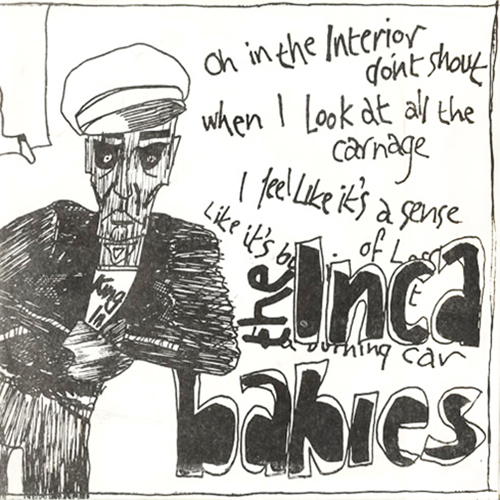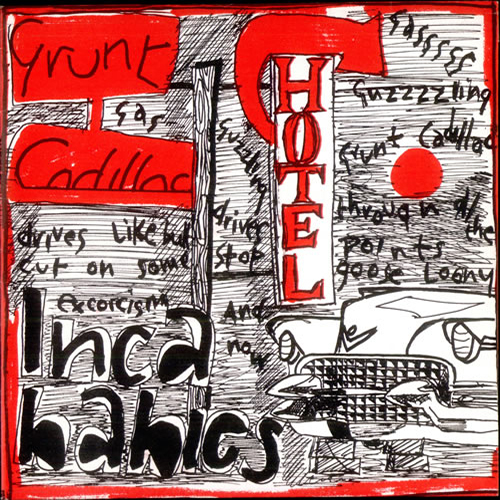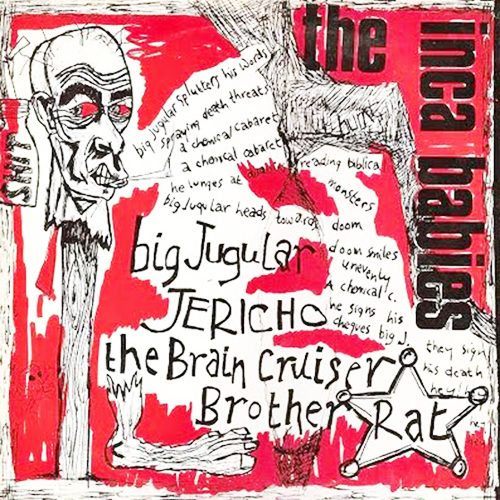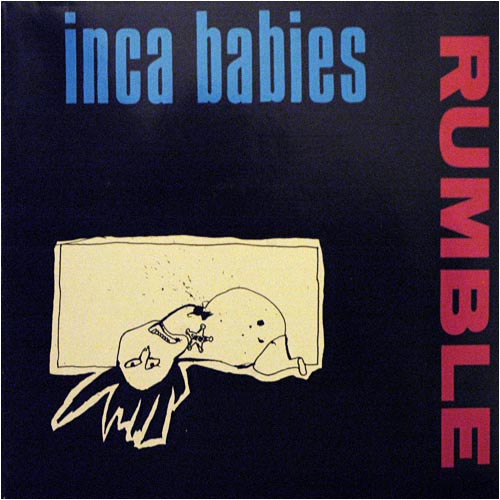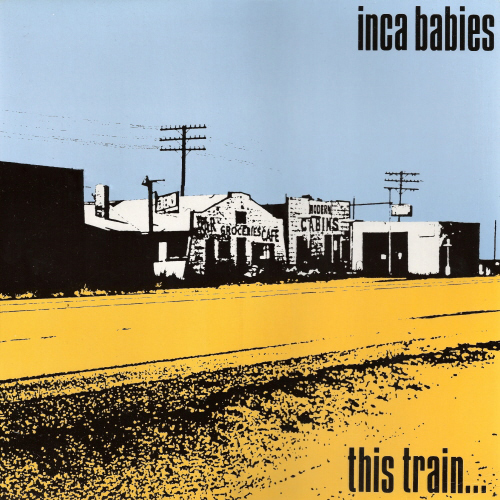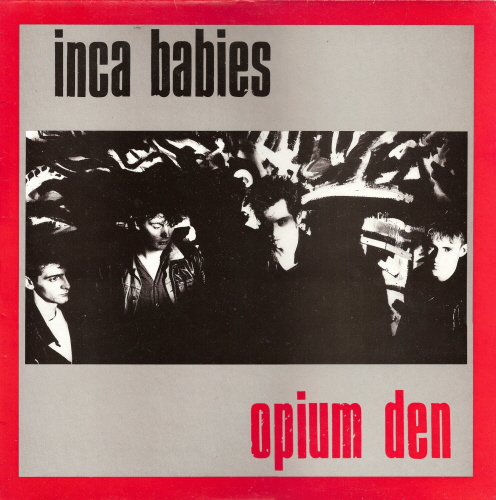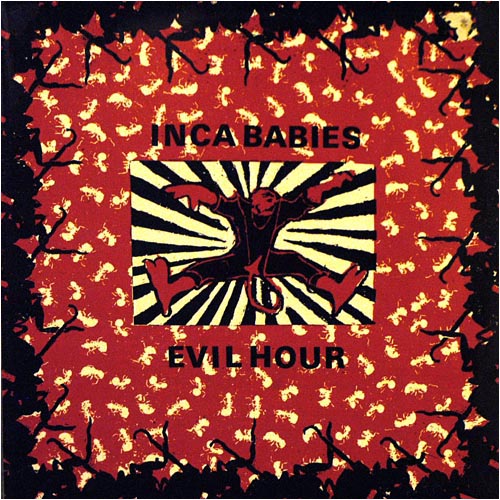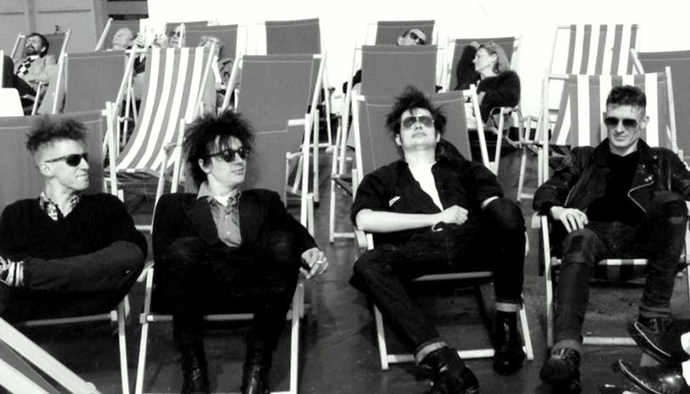

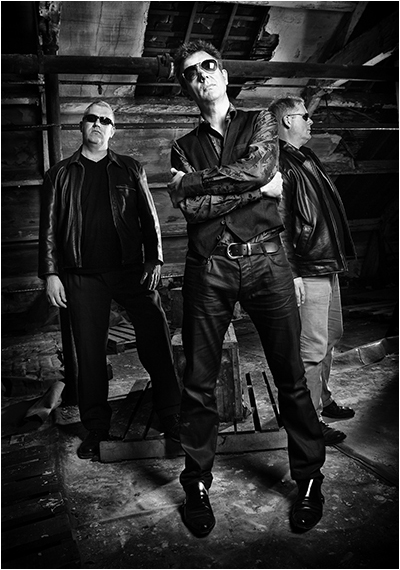
The Inca Babies are back!
Harry Stafford relives a few memories
of life as a perennial outsider
Additional thoughts from Rob Haynes
Interview: Adam

Had you been forced to endure the dross that was topping the mainstream charts in 1983 it would have brought more than just a shiver to your spine, it would have had you heaving your insides out with such incapacitating ferocity you’d have to carry your internal organs round in a carrier bag everafter – Renee & Renata, Phil Collins, Kajagoogoo, Bonnie Tyler, Duran Duran, Paul Young, Culture Club – you couldn’t come across a more repellant roster in your deepest, blackest nightmare. It truly was the worst of times, but while the world was marching unwittingly down the road to hell, on some of us fortune was smiling. For, by 1983, things had changed and the happy few ... well we just weren’t listening.
The blast of punk rock had caused a cataclysmic shift in the strata of the music world. No longer would those innovative spirits with taste and style and drive have to take on the ‘music biz’ in order to get themselves heard; walls thrown up could be undermined, daylight disc jockey drivel could be laid to rest in the hours of darkness, and all the glitz in the world could never dazzle through the darkest of shades. For there had been a declaration of independence. There were no longer a handful of major labels dictating the taste of a nation, but a whole host of independents offering up an enthralling variety of challenging, invigorating and intelligent music. A vibrant music press prized itself free of corporate shackles to embrace this new world and adorn it with a fierce intelligence, engendering an uplifting sense of freedom. You could live your life immersed in music yet never experience the counting down of a top forty; you could live in a better world, an untainted world where everyone dressed in black and had bloody fantastic hair. In 1983 we were still basking in the glow of Pornography and A Kiss In The Dreamhouse ... and then were offered The Bad Seed, Fetisch, The Burden Of Mules, ‘Crow Baby’, ‘The Temple Of Love’ and ‘Song To The Siren’. It truly was the best of times.
And suddenly another voice came screaming out of the darkness. A malformed beast slowly began to drag itself out of the depths of the Black Lagoon, driven on by crushing drums and a hollow, reverberating bass. “Wounded souls lie in my box, I curse the man who put them there,” it howled, lashed by the barbs of an awkwardly scything guitar. “The tongue is scorched to the very root of the interior.” The Inca Babies had arrived.
“The idea was to take it down to the bare bones of a really intense rhythm and have someone squeal innuendos and violence at you. I thought it rather worked,” comments Harry Stafford, the Babies’ founder, songwriter and guitarist. “At that time in Manchester, the rest of the world were into this hideous concoction called jazz-funk and I can’t describe how awful it was. Northern Soul had evolved into this disco by any other name, but it had been given a posher title and it was just dire. I used to go to clubs to meet people and I was hearing this music and refusing to be part of any scene there whatever and waiting for it to disappear. It never did disappear as it turned into house music and then acid house and rave. It was awful.”
Stafford’s answer was to form his own band who would produce a sound which would prove the antidote the world required to rid itself of this revolting blight. He gathered together bassist Bill Marten, drummer Alan Brown and vocalist Julian Woropay and began to hurl defiance at the sea of soul that surrounded him. However, he was soon to find that the Inca Babies were destined to be perennial outsiders, rejected by both the city’s mainstream and the happening underground. “In Manchester playing what we did, we stuck out like a sore thumb and we never really fitted in. A lot of Mancunians patronised us, saying “Oh yeah, you’re good at what you do, but you’re not really one of us. You don’t have Northern Soul sensibility.” I came from the south of England, so of course I didn’t have Northern Soul sensibility. And I remember people making compilations of the (underground) scene and getting all the bands together like Big Flame, A Witness, the Membranes and the Fall and we were never asked to be any part of these. We were just rock. They used to use the term ‘rockist’; we were considered ‘rockists’. But people still came to see us so I don’t think there was that much wrong.”

Perhaps the Inca Babies were just that little bit too leftfield to be embraced comfortably? Perhaps too much even for themselves, as the band line-up quickly changed, with Mike Keeble taking over on vocals after just one single release, and Pete Bogg replacing Brown at the same time. ‘Grunt Cadillac Hotel’, released in March 1984 showed no lightening up in mood, dressed in a black and blood red sleeve decorated by Stafford’s cartoon doodlings and broken lyrics, it was stuttering blast of record, two and half minutes of intermittent slaps in the face.
It would be crass to say people don’t make records like the Inca Babies today as, sadly, there are few musicians making records anywhere near as darkly foreboding as those of the trailblazing bands of that era. But it is true to say very few bands made records like the Inca Babies even back in those halcyon days. Their songs were an amalgam of influences, adopting the deconstructionism and manic fixations of the Birthday Party but imbuing their sound with the dark Americana of the Gun Club and the horror b-movie rumble of the Cramps. “Our influences were a mixed bag between the four of us,” Stafford explains. “Bill was strangely an old rockabilly. He liked Elvis and Gene Vincent and old rock and roll. He loved The Cramps and some of that newer stuff like The Meteors. Mike liked Joy Division and the old Unknown Pleasures stuff. I liked Gun Club, Birthday Party, Einsturzende Neubaten, Cabaret Voltaire. I was considered the person who liked all that non-musical shit. Pete was very into Chess Blues and old Sun recordings and music from the fifties. And we came together to make the sort of stuff we did. It was a good combination.”
The new line-up of the band went on to record four more astonishing singles and two albums over the next couple of years, causing major dents in the independent charts and all released on the band’s own Black Lagoon label through York-based Red Rhino, the major northern component of the Cartel distribution co-operative. “When we started off we thought right, we are going to get all these bands we are in to,” Stafford remembers. “We’re going to get a sound, we are going to be like Rough Trade, like Factory Records, like Mute, but there weren’t enough bands to actually get a roster together. Being in Manchester, we were the only band of our ilk.” Black Lagoon issued a couple of singles by other groups but never did manage to lay any solid foundations. The Inca Babies were outsiders still.
Despite their prolific output, it was generally left to Stafford to direct the band's progress, creating all of the band's artwork and writing their songs. “I pretty much wrote all of the lyrics. Bill wrote some of them on (debut album) Rumble, the more kind of fruity sort of shock horror stuff, and Mike wrote a few but generally I wrote them. The others would throw stuff in and inspire me so I can’t claim I wrote everything. Certainly I put pen to paper and then was nudged every now and again. I didn’t think we would ever become rich from our publishing deals ... and I was right ... and I thought everyone should get a credit, so it was ‘Songs by Inca Babies’. I can’t play drums so I reckon what the drummer does is part of the song and the singer’s style of putting the lyrics together is all part of the whole, which I thought was how it was going to work, so yeah. Strictly speaking I wrote all the songs, but the spirit of it all was shared.”
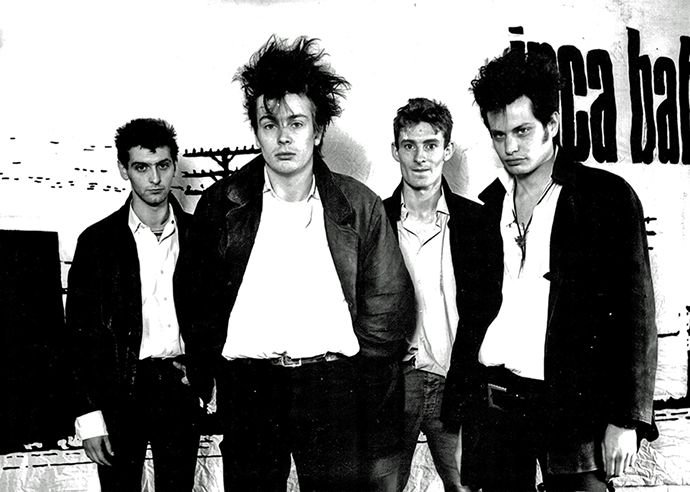
Keeble decided to quit the band after the release of the band’s 1986 second album This Train... though it wasn’t through Stafford’s lack of trying to get him more involved. “Mike felt that he was there as a kind of performer as opposed to adding to some of the craziness. He was actually a very good graphic artist and I wanted him to contribute more but I don’t think he felt confident enough. He was pretty talented, at the Manchester Polytechnic art college and I was in the English Department. And Bill was at Manchester University doing History. Pete, I think, did Geography, and Alan did Politics ... so we were all at university. Julian was another art student ... we trawled the art schools for crazy guys. Julian was an artist and he was dead keen on being a front man and he played about three gigs and after that it was almost like he had achieved his ambition. He was on ‘The Interior’ and really went for it ... it was a good effort and that was enough for him. After that, it was Mike on ‘Grunt Cadillac’. We all had identity crises; everyone had to call themselves different names. Pete was Pete Kennedy for some reason. Mike was Little Louis, Julian was Big Louis, Bill was Bill Bonney. I was just me. I refused to enter into this identiy crisis. Harry Stafford is my real name.”
With Keeble gone, Stafford decided to take over on vocals and Darren Bullows was added to the band as an extra guitarist. A mini album Opium Den was recorded and reflected the changes in the group dynamic. “I didn’t immediately want to be the singer,” Stafford muses, “but with Opium Den it was a case of being able to direct what I wanted more from the songs. I could put the guitar and the vocals together so the lyrics then actually fitted more into the actual melodies and the riff as opposed to when you are trying to instruct someone, telling them to “Sing it like this”, or “Sing it your own way” which is often what happens if you get a slightly square peg in a round hole. It worked in a different way.” The album certainly marked a sea change in the Babies’ sound. “That was when we started writing, not so much proper songs, but songs which had perhaps a little more method. They were more recognisable songs as opposed to freeform exercises in guitar rhythms.” With Stafford at the microphone, the Babies began to relate stories rather than simply shout in your face.
If the band thought things had finally settled down, events quickly proved them wrong. Red Rhino went bankrupt and its collapse marked the beginning of the end for the Cartel, threatening the whole structure that had made independent record labels viable. Black Lagoon found itself in limbo. “Red Rhino Records became unstuck and we couldn’t release records on Black Lagoon because we owed them lots of money. We would give them product and they would press it up. I think they probably pressed thousands and thousands of copies of our records and while we sold quite a few I don’t think we quite sold as many as I think they hoped we would. And they went bust because of doing things like that.” German label Constrictor stepped in to pick up Opium Den and then went on to release the first incarnation of the band’s final album Evil Hour.
“I was a bit disappointed with it,” remembers Stafford. “We started off with this one drummer, a guy called Johnny, but he just wasn’t up to the job sadly; he couldn’t quite deliver and the producer took me to one side and said, “Look, this isn’t working. You are going to have to ditch the drummer.” And I said, “No, it will be alright, we can keep going.” But after another day and half of trying out things we said, “Sorry, we’re going to have to use someone else,” and we got this guy called Tony in, but Tony was just a mad dynamo of a drummer and carried everything far too fast. So there was me trying to create this nice rumbling subtlety and it was 1234dahdahdah ...... At the time you think, “Is that too fast? Not quite sure” and of course you play it back a week later and you think, “Oh God, it’s like someone playing it at 45 instead of 33.” You know when you go and see a band and they start up your favourite tune and they play it really fast because they’ve been on tour for something like two months and it’s lost the magic. They’ve just turned it into just a two and half minute thrash and I felt some of the songs on Evil Hour suffered from that: they were just too fast. There’s some good ideas on there I thought; it was well produced, and Clint Boon was great. Clint played organ on it and he went on to do great stuff with Inspiral Carpets. It was a different kettle of fish. It was us moving on yet further.”
But Evil Hour was to mark a slightly downbeat end for this truly original and remarkable band who acknowledged their departure simply by claiming they had run out of drummers. A handful of classic vinyl records seemed to be the Inca Babies' only legacy until 2007 when the IBD booking agency enquired whether the group would be interested in reforming to play a gig in Germany in recognition of their twentieth anniversary. Stafford jumped at the chance. “We were the first band on them, so we said yes and after that we thought we may as well do some more gigs. It seemed like a good idea to do it. It was just me and Bill, but we’d known Rob Haynes from Goldblade for ages. We had played in a band with him after the Incas where he played metal percussion for us, so he seemed the ideal candidate to play proper drums. He’s actually a really good drummer and we insulted him by giving him metal to bash but he took it in his stride and it was great; we started rehearsing and did that gig and it was a load of fun. It had been twenty years – or nineteen to be precise – since we had finished the band in 88 and because of that it was a case of ‘let’s give it a try’. It was actually fun playing those old songs again because we really hadn't played them for such a long time. It was strange but it was also quite cathartic because it was like reliving a little bit of your past.”
Having enjoyed themselves on the road, Stafford settled down to write some songs for a new album, but yet another blow was to strike out of the blue, the unexpected death of Bill Marten. It hit Stafford hard. “He was having trouble at work and he was feeling really down. He had depression for a number of years and slowly just began to tip downwards. With these things you never quite know how bad it is until of course the worse happens. I’d known him for twenty-six years before that and it was a huge surprise. It was one of those things that absolutely ... the world suddenly starts turning very slowly. But, you know, he wanted to go and he did ... there were no cries out for anything, no final gesture. We decided to continue with the band simply because Bill used to have fun with it even if it wasn’t enough to get him out of of his malaise. We had played in Germany, played in London and played in Manchester and he was enjoying it. I think he would have wanted us to go on. Also we were working on this album and thought if we could release this record it would be a tribute to him and that would be an apt thing to do if only for us to keep his memory alive for a bit. Even though he didn’t play on the record he certainly helped put it together in a certain way; his style and charisma were very much a part of what made us put that record together. I think in a lot of respects it is a fitting tribute to Bill.”
Rob Haynes agrees, "Bill's death was obviously a tremendous shock, and if Harry would have wanted to stop the band at that point then clearly that would have been that. But so much of the band's character and success was down to Bill, and the best tribute seemed to be to carry on what we'd started. Consequently, making Death Message Blues seemed a more celebratory process to me rather than being any sort of ordeal."
Former A Witness bassist and longstanding friend Vince Hunt stood in to complete the album and has remained with the band to this day, working over two years with Stafford and Haynes to record the Inca Babies’ second comeback album, Deep Dark Blue, released in November 2012. (Our review of the album is here.) Again, the band’s sound has progressed, continuing the journey that began way back on Opium Den. It’s a terrific collection of dark stories played out to an impressive backdrop of warped rock and roll and psychobilly swagger. “An older Inca Babies is the sound I think we were after,” explains Stafford, “and that’s what we went with. I try and write a story in most of the songs so there is a beginning, middle and an end so that when a song does come to an end there has been a purpose to it all.”
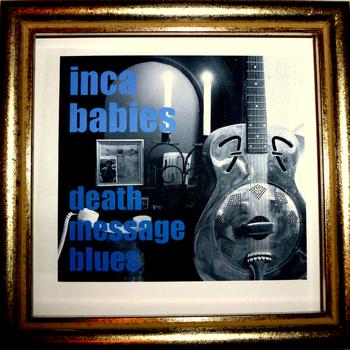
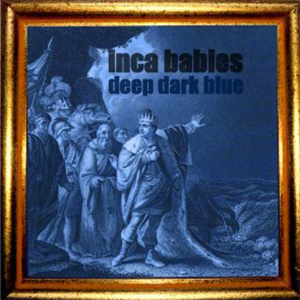
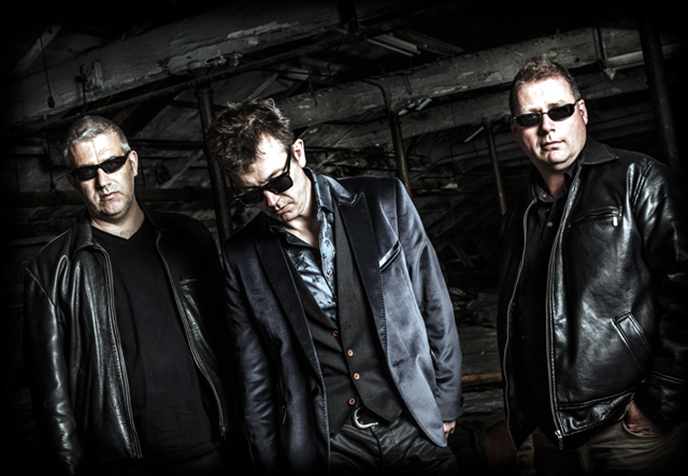
Next year marks the band’s thirtieth anniversary and they will be playing dates in Germany and the UK to build on the new release. You won't miss out on the old songs either and the Inca Babies are still as ready to rumble as they ever were. Rob Haynes explains, "The live set varies in old / new material ratio. Obviously with having recorded two new albums we like to include new songs, but the backbone of the set will always be old material, which is great to play. My personal favourite is 'Lung Knives' (from the 'Surfing in Locustland' EP), a breakneck offering which often closes the show. When I joined the band in 2007 I had to learn the old songs from the original recordings, and at times it could be quite a challenge discerning what was going on. Like many bands of that era, they started playing with the blind vigour of punk and rock and roll, and made up their own musical rules as they went along. I love that energy though, and I'm always eager to include rough and raucous new material when we're writing."
Thirty years down the line the Inca Babies' recordings are not just a collection of outstanding songs from independent music's golden age, but for those of us who were there, they remain pretty much a life statement; a declaration of intent. It's great to see the band back amongst us and continuing to tread on our shadows. New songs or old, they won't fail to thrill, and if you want a night to remember, don't dare miss them if they get to play near you.
Isolation on Facebook. Like us.
Isolation contact

